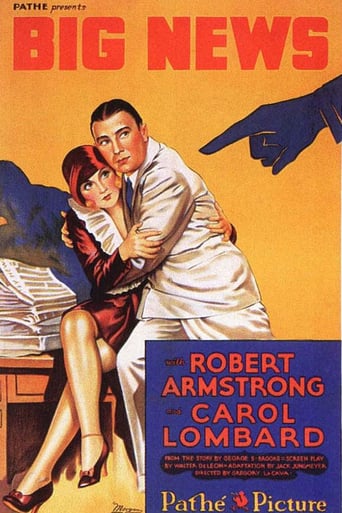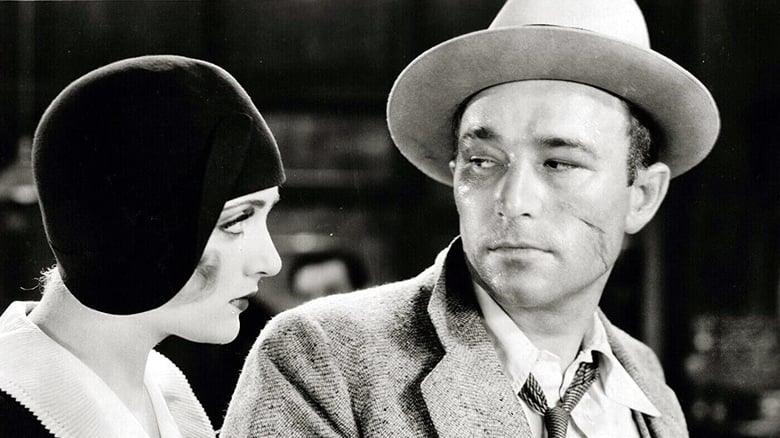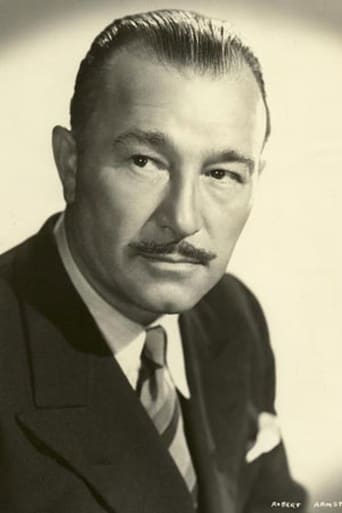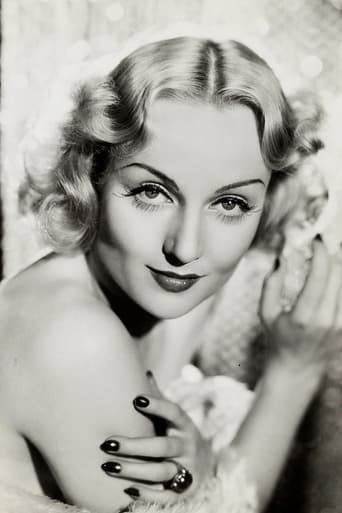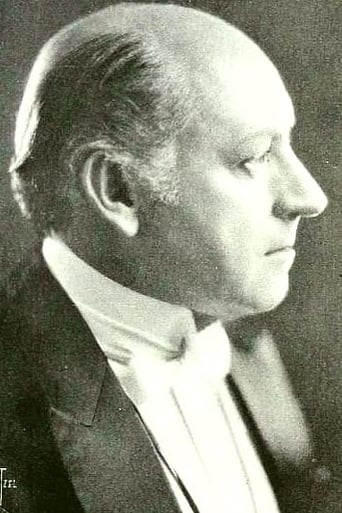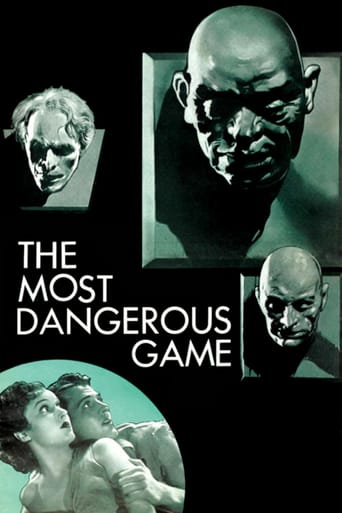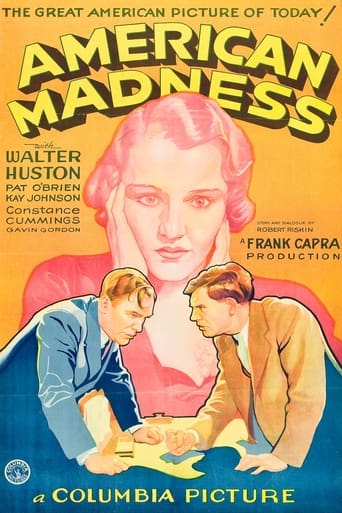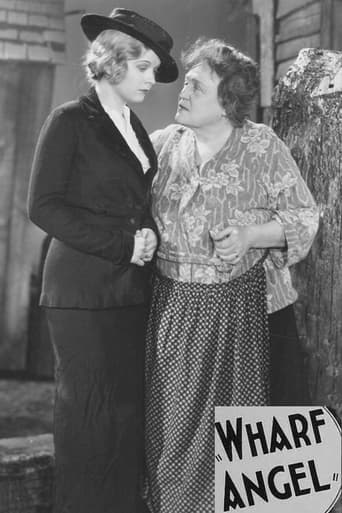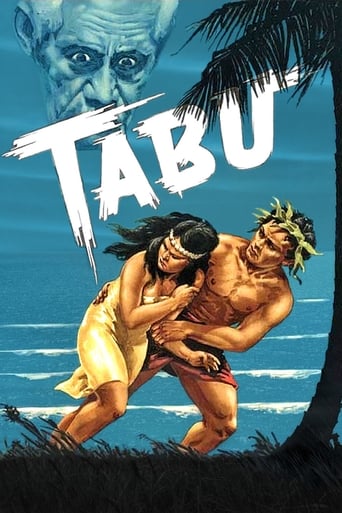Big News (1929)
A reporter's marriage is jeopardized by his drinking and he finds himself accused of a murder he didn't commit.
Watch Trailer
Cast


Similar titles
Reviews
Excellent, Without a doubt!!
A movie that not only functions as a solid scarefest but a razor-sharp satire.
The film never slows down or bores, plunging from one harrowing sequence to the next.
Through painfully honest and emotional moments, the movie becomes irresistibly relatable
I'd give this one a 5/10 if it wasn't for some of the unique things going on. Some of it is just plain cheeky. For example, I think the name "Big News" was given to the film to confuse people with the play "Good News" that was made into a film the following year. The opening score even has some of the music from "Good News" in it, though cleverly disguised.This one is an early talkie, plus it apparently was made on the cheap at Pathe, so the entire film basically takes place in two rooms - The news room of driven but often drunken reporter Steve Banks (Robert Armstrong), and a speakeasy that is a front (it must be, there are never any customers!) for a drug dealing operation run by Joe Reno (Sam Hardy).Banks likes to go drinking with O'Neill (Wade Botellier), a drunken discredited and thus ex reporter, and Steve's absentee home life has his reporter wife (Carole Lombard as Margaret) coming to the newsroom to tell Steve she is calling their marriage quits. Meanwhile, Joe Reno is worried that Banks is going to expose his dope peddling operation, and calls the newspaper to say he's been drunk and disorderly and bothering the nonexistent customers at his completely illegal business. The paper fires him.Banks reacts by going to Reno's speakeasy with his drunken friend (WHY DOES HE NEED THIS GUY?) and HE ACTUALLY LETS HIM IN!!!. Reno then unintentionally tips his hand to Banks who gets the evidence he needs and writes up an expose on Reno's operation. This dawns on Reno AFTER Banks leaves.Banks has been fired. Reno knows this. For some reason he goes to where Banks used to work - Banks might have given the story to a completely different paper and never returned - and frames him for a crime of which he is easily absolved. Plus Reno is seen by everybody including Banks AND the cops AND everybody knows Reno had a motive to do what he did. What an idiot! I'll let you watch the terrible print that is available and see what happens.Why am I disrespecting Carole Lombard? Because she is a mere shadow of the actress she'll be just five years later. But part of it really isn't her fault. The lines she is given are ridiculous and actually sound like the stuff of title cards from the 1910s. She is either tall statuesque and silent or overacting hysterically. But she improves tremendously in just this year. Her next film, Racketeer, is much better. But you would never guess by this one performance that she is the member of the cast people are most likely to remember almost 90 years later.There is one weird angle that you would never see after the production code. I guess to fill up time there is a part for an overweight lonely hearts reporter - Helen Ainsworth as Vera - who dresses in men's' clothing and does a kind of risqué vaudeville comedy routine between scenes to lighten the mood. The paper editor warns her "Don't be gay on my time!". Only in the precode era, and probably only in this first full year of talking film. Recommended for the goofiness of it all.
The snap, crackle and pop you are hearing isn't your cereal bowl. It's the soundtrack of this nearly 90 year old film that is trying really fast to capture the magic of the Broadway play "The Front Page". The only thing it really offers is a glimpse into the early days of sound films and early appearances of future stars Robert Armstrong ("King Kong") and 30's superstar Carole Lombard, here without that unique "e" at the end of her first name. This deals with the daily goings on at an oddly run news room where there seems to be more drinking going on and playing around than actual journalism. Static camera work can't help a lot of pre-code dialog, much of it recited by an initially funny butch newspaper woman who is told by the editor not to be so "gay". After a while, this obvious novice becomes a real pest. Lombard really gets nothing juicy to work with as Armstrong's divorce seeking wife, while he really overacts.
The plot elements of this movie, in my mind, take second place to the repartee, or verbal fencing, that takes place among various characters. One character is always needling another; each tries to top the others in snarky insults. I suppose this is where the "comedy" label comes from.For instance, there's the repartee among the various reporters on Robert Armstrong's newspaper. Cupid Ainsworth (a large fat woman) comes in, saying she's late because "I couldn't find a cab." Armstrong responds, "You mean you couldn't find one to fit you." Ainsworth gives as good as she gets, however. When Armstrong comes back into the office after being bawled out by his wife, she says, "Well, well, well! Here comes the lion with the lamb's haircut!" (Ainsworth gives a very memorable performance in this movie, in my opinion.) When Armstrong goes into the editor's office to get bawled out, Ainsworth cries, "Hold on boys, we're going around a curve!" (To me, that was better than Bette Davis' famous line, "Fasten your seat belts, it's going to be a bumpy night!") Tom Kennedy is in the movie, playing a cop. (I always think of Kennedy as Gahagan, from the Torchy Blane movies.) Armstrong refers to Kennedy as "Flatfoot," and he growls, "Lay off the puppies!" Armstrong and his even-more-drunken buddy get into a battle of wits in a speakeasy with members of a drug-dealing gang. Armstrong says, "I recently heard of two hop-slingers who were punished by being put in a barrel with a skunk. Fortunately, the skunk died." His buddy responds, "He was probably bored to death by their repartee." I think this movie has a quite adult sensibility as regards inter-personal relationships and conversation. (Adult meaning "adult," not "dirty.") It's not a Pollyanna or Hollywood sensibility -- there's friction and oneupmanship among various characters. That makes a refreshing change. Kennedy's cop role is also more adult than his slapstick-ish Gahagan roles. I like the whole tone and atmosphere of this movie.I always enjoy seeing Armstrong, who is perhaps best known as the impresario who brought King Kong back from his island. He was a quite prolific actor, and always interesting.George ("Gabby") Hayes is also here briefly, and I'm always fascinated to see him in a movie, beardless and in an adult, not slapstick-ish role.In the end, the murder is pinned on the actual perpetrator (yay!), and Armstrong and his wife are reconciled. I like a movie with a happy ending, and to see justice is done.This movie, to me, is enjoyable, adult, and fun every time I see it.
Steve Banks is a hard-drinking newspaper reporter. His wife Margaret, a reporter for a rival paper, threatens to divorce him if he doesn't quit the drinking that is compromising his career. Steve pursues a story about drug dealers even when his editor fires him. When the editor is murdered, Steve is accused of the killing. But Steve has an ace up his sleeve that may save him from the electric chair. Does this sound like a comedy? That's where IMDb puts it. It's a weird and dumb movie.

